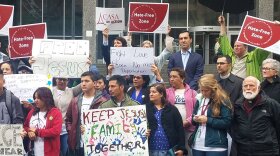U.S. Attorney General Jeff Sessions and Department of Homeland Security Secretary Kirstjen Nielsen came to Baltimore today to talk about immigration and Central American gangs. Sessions tied that to Baltimore’s soaring homicide rate.
Sessions spoke of increases in violent crime nationwide, in part fueled by the Central American gang, MS-13, then turned to Baltimore.
“This city has experienced violence that we haven’t seen in a quarter of a century," said Sessions quoting FBI statistics. "The violent crime rate is up by one-third. Rape is up by 22 percent. Murder is up by half, 50 percent.”
Last week Mayor Catherine Pugh applauded the efforts of the multiple city agencies that reduced the homicide rate by 33 percent in November.
City Councilman Zeke Cohen said in an email that Sessions comments “miss the mark.” MS-13 “is not a serious factor in our city,” he wrote.
Sessions and Nielsen also said President Donald Trump wants to do away with a system that allows randomized selection of immigrants to enter the country and bring family members and replace it with a merit based system of immigration
“We should give priority to those who are likely to thrive here," said Session. "Such as those who speak English already and are highly skilled. Not someone chosen at random or happens to be someone’s relative.”
When questioned about requiring immigrants to speak English, Sessions said that in Canada the merit based system gives points for immigrants based on their ability to speak either French or English, educational level, and job skills that may meeting U.S. economics needs.
David Rosario, director of Baltimore’s Latino Provider’s Network says a merit based system would look at people as numbers.
“Whereas you know we don’t take a holistic approach to people coming in with families," said Rosario via phone interview. "I think that separation of family is something that needs to be looked at and kept intact.”




